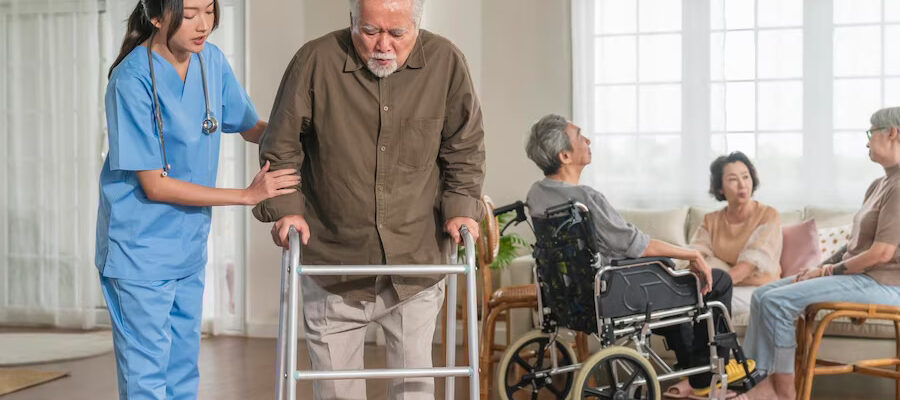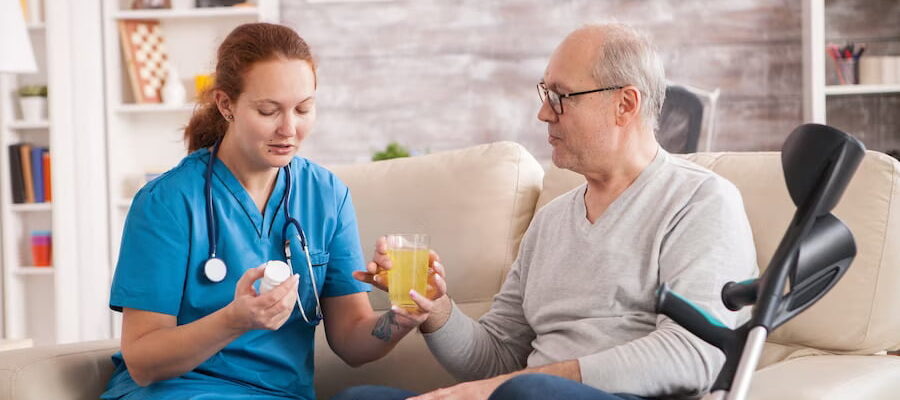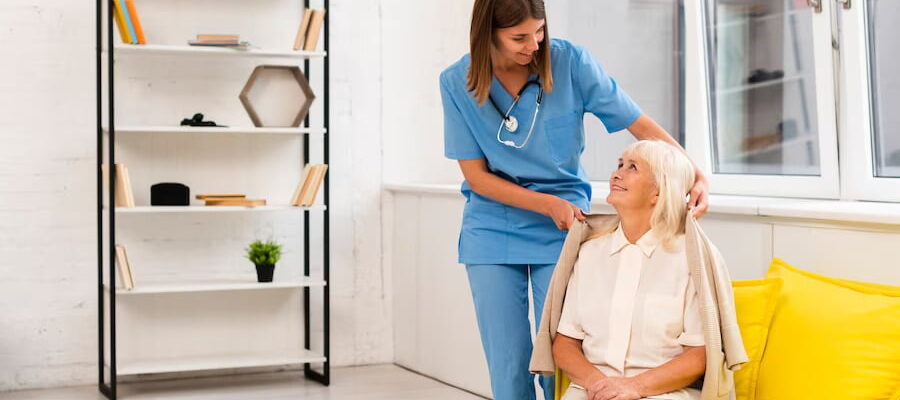
Keep Loved Ones Safe at Home
Most aging adults prefer living in their own home. To make it happen, create and carry out a safe living environment that removes hazards and threats. Once a plan is in place, the wish to age in place is possible.
FALLS
According to the National Institute of Health, six out of 10 falls happen at home. It’s where people, especially older adults, spend much of their time. Like most individuals, seniors take the safety at home for granted. They move around freely, giving little thought to the hazards around them. Falls could be prevented by making simple changes in living areas, as well as personal and lifestyle changes.
In Every Room
- Replace long pile carpet with the a short version.
- Arrange furniture around the outside edges of the room to clear walking paths.
- Make rooms well-lit and allow ease of turning on lamps without having to walk through the room in the dark.
- Raise heights on chair and sofa seating.
- Keep floors clear of clutter.
- Eliminate pointed or sharp edges on furniture by replacing it or covering corners with padded materials.
- Place phones in an area that is easily accessible.
- Keep medications in an area that’s reachable and clearly marked.
- Make a list of phone numbers in large lettering and place it near all phones.
In the Kitchen
- Clean up spills right away.
- Provide grip extension tools for seniors to get things from high shelves.
- Discourage seniors from using step stools.
In the Bathroom
- Install non-slip strips or rubber mats in the bathtub.
- Install railings in the bath and near the toilet.
- Use a tub seat for showering or bathing.
- Make sure towels and cords are up off of the floor and clean up any standing water.
Outside
- Inspect handrails on steps and make sure they are secure.
- Use ice-melting materials on icy sidewalks.
- Assist seniors when walking on uneven walkways or using stairs.
Fall Risk Factors
- Impaired vision – Glaucoma and cataracts significantly impair vision and depth perception.
- Osteoporosis – Contributes to loss in bone density which increases a person’s chances of falling.
- Lack of physical activity – Leads to decreased muscle tone, poor balance, and impaired flexibility.
- Medications – Watch for side effects like drowsiness, dizziness and changes in blood pressure.
- Pets – Tripping over a cat or dog prowling around one’s ankles, pets toys, and tangled in a leash.
SCAMS
Rule: Never underestimate the cleverness of scammers and criminals.
According to the Federal Bureau of Investigation (FBI), the threat to seniors grows and changes. Since the elderly population is on the rise, the criminals modify targeting techniques; telephone calls, mass mailings and online scams like phishing. It’s a practice to trick someone to give secret bank information by sending an e-mail that mirrors one from the bank.
***Criminals (targeting elderly) are increasingly located outside the U.S., making it difficult for American law enforcement to track them down.
Leading Senior Scams
- Identity theft – Finding personal information in dumpsters, phishing, address changes
- Health insurance frauds – Rolling lab schemes, medical equipment, Medicare fraud, counterfeit prescription drugs
- Home repair schemes
- Foreign Lottery and Sweepstakes fraud
- Advance fee and Credit card frauds
- Investment fraud
- Charity schemes
Tips to Avoid Senior Scams
- Join Do-Not-Call Registry
- Shred sensitive documents
- Call Better Business Bureau on suspicious phone calls or mail
- Do Not give out personal information over the phone to unknown persons
- Monitor your bank and credit card statement for unauthorized transactions
- Do Not give money or credit card information over the phone
- Check on charities asking for money – call the State Attorney General Office
- Learn about email and phishing schemes
- Pay close attention to telemarketing, Internet, phone and mail schemes
- Check your credit report at least once a year
- Protect your Social Security number, account numbers and passwords
Top Reasons Seniors are Targets
- They’re retired and less mobile
- They’re isolated
- They’re lonely
- Some live with dementia
- They have money, property, life savings and other assets
NUTRITION

Healthy Eating
Seniors at home eating alone, find it difficult to eat healthy meals. Shopping and cooking hindered with dexterity, mobility and balance, make meal planning a challenge and too much trouble.
Their food choices are frozen meals, snacks, and take-out. As a result, the food’s loaded with sodium, cholesterol, and sugar; low in vitamins, minerals and protein.
If one lives with chronic illnesses like diabetes, high blood pressure, weight and high cholesterol, their health is negatively affected. According to the National Institute on Aging, older adults can make wise food choices and learn about food labels, food safety, meal planning, food shopping, and ways to enhance nutritious eating.
Better Food Choices
Vegetables
- Dark Greens veggies; broccoli, salads greens, and cooked greens
- Orange veggies: carrots and sweet potatoes
- Dried beans; pinto, black, kidney beans and lentils
- Fruits
- Bananas, berries, grapes and oranges. Fresh and frozen or dried. Eat fruit rather than drinking juice
- Grains
- East 3 oz. of whole grain cereals, bread, rice, crackers or pasta every day
- Eat cereals with B12
Protein
- Low fat or lean meats and poultry
- Bake, broil, grill
- Vary choices to include fish, dried beans, seeks, tofu, nuts.
Dairy
- Low-fat or fat-free milk, yogurt
Water
- 8 glasses a day
Make better food choices
USDA MyPlate for Older Adults
Health Eating After Fifty
- Eat many different colors and types of vegetables and fruits.
- Make sure at least half of your grains are whole grains.
- Eat only small amounts of solid fats and foods with added sugars.
- Limit saturated fat (found mostly in foods that come from animals) and trans fats (found in foods like store-bought baked goods and some margarines).
- Eat seafood twice a week
NEGLECT and ABUSE
Neglect and abuse refers to negligent acts by a family member, trusted friend, and service professionals. It causes harm and hurt to a vulnerable elder.
Elder abuse and neglect happens frequently, more than we’d like to admit. To keep your loved one free of harm, learn the signs and act immediately. .
Warning Signs
Financial Exploitation
- Lack of comforts in one’s home
- Giving excessive gifts or financial reimbursement for needed care and companionship
- A person’s in charge of elder’s money but fails to provide for the needs
- Transferred property, the Power of Attorney, or Will and has little memory how it occurred
Physical Abuse
- Visible signs of unexplained fractures, bruises, welts, cuts, sores, or burns
- Unexplained sexually transmitted diseases
Neglect
- Lacks food
- Lacks medical aids like walker, dentures, medications
- Person with dementia left unsupervised
- Confined in bed is left without care
- Cluttered and dirty home
- Lacks adequate facilities like stove, refrigerator, heating and cooling, plumbing, or electricity
- Untreated bed sores or pressure ulcers
Protect Seniors
If You Suspect Abuse
Report It. Act to protect seniors by bringing suspected abuse to appropriate authorities.
Contact your local adult protective services agency. For state reporting numbers, call the Eldercare Locator at 1-800-677-1116.
FIRE
According to the United States Fire Administration, close to 1,100 U.S. citizens over the age of 65 die as a result of a home fire. Leading Causes of fire:
Smoking carelessly
- Never smoke in bed
- Put it out at first sign of feeling drowsy
- Use deep ashtrays and put it all the way out
- Don’t walk away from lit cigarettes and other smoking materials
Cooking safely
- Never leave cooking unattended.
- Always wear short or tight-fitting sleeves when cooking
- Keep towels, pot holders and curtains away from flames.
- Never use the range or oven to heat your home.
- Double-check the kitchen before you go to bed or leave the house.
Heating for warmth
- Keep fire in the fireplace and place a screen large enough to catch flying sparks and rolling logs.
- Space heaters need space.
- Keep flammable materials at least three feet away from heaters.
- Use a space heater that has control features to automatically shut power off, if the heater falls over
- Roxy care Home Nursing
- At Roxycare, we believe Service to Mankind is Service to God. Making healthcare affordable
- and accessible to every person is our main goal.
- Roxycare homecare provides a wide range of nursing services available at your doorsteps.
- Experience the top-notch home care nursing services with us.
- To book your service,
- Reach us out on 08095018181



